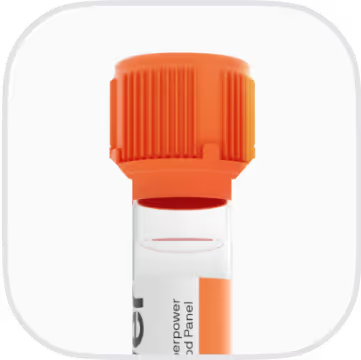What are Acute Stress biomarkers
Acute stress biomarkers are fast‑changing signals in your blood that rise within minutes when you face threat, effort, pain, or acute illness. They reflect the body’s immediate “alarm” response and show how intensely it mobilizes energy, sharpens attention, and primes the heart and circulation. Testing these markers gives an objective snapshot of your fight‑or‑flight activation and stress hormone surge, helping quantify the timing and magnitude of the response and how quickly it settles afterward. Key players come from two linked systems: nerve‑driven messengers from the sympathetic arm—adrenaline and noradrenaline (epinephrine, norepinephrine) released by the adrenal medulla and sympathetic nerves—and the brain–pituitary–adrenal pathway—ACTH from the pituitary driving cortisol from the adrenal cortex (hypothalamic‑pituitary‑adrenal axis). Additional readouts include copeptin (a stable proxy for vasopressin/AVP that mirrors circulatory stress), prolactin, neuropeptide Y, and early immune signals such as interleukin‑6 (IL‑6). Together, these biomarkers translate your body’s rapid stress signaling into measurable data, enabling clear tracking of acute stress load and recovery in real time.
Why is blood testing for Acute Stress important?
- Understand how acute stress raises cortisol and blood sugar in your body today.
- Spot cortisol spikes that drive anxiety, insomnia, cravings, and glucose surges.
- Flag low morning cortisol that explains fatigue, dizziness, and low blood pressure.
- Detect stress-related glucose rises that unmask prediabetes or diabetes risk.
- Track trends over time to see recovery from stress or persistent dysregulation.
- Guide care plans for steroids, sleep, stress reduction, and metabolic risk.
- Protect fertility and pregnancy by identifying cortisol–glucose patterns impairing ovulation and raising gestational risks.
- Best interpreted with time-of-day, fasting status, A1c, steroid use, and your symptoms.
What insights will I get?
Acute stress blood testing provides a window into how your body responds to immediate challenges, revealing the resilience and adaptability of key systems like energy metabolism, cardiovascular function, cognition, and immunity. At Superpower, we focus on two core biomarkers—cortisol and glucose—to assess your body’s acute stress response.
Cortisol is a hormone produced by the adrenal glands in response to stress signals from the brain. It helps mobilize energy by increasing glucose availability, supporting alertness, and modulating immune activity. Glucose, the main sugar in your blood, rises quickly during acute stress as cortisol and other hormones signal the liver to release stored energy. Together, these biomarkers reflect how efficiently your body can mount a rapid, coordinated response to stress.
Healthy cortisol and glucose levels during acute stress indicate that your body can maintain stability—what physiologists call homeostasis—under pressure. This balance supports clear thinking, stable mood, and effective immune defense. If these markers are too high or too low, it may signal that your stress response system is overactive, underactive, or struggling to recover, which can affect overall system health.
Interpretation of acute stress biomarkers depends on several factors. Age, time of day, recent illness, pregnancy, and certain medications can all influence cortisol and glucose levels. Laboratory methods and timing of sample collection also affect results, so context is essential for accurate understanding.







.avif)



.svg)





.svg)


.svg)


.svg)

.avif)
.svg)










.avif)
.avif)
.avif)


.avif)
.avif)




.svg)




.avif)


